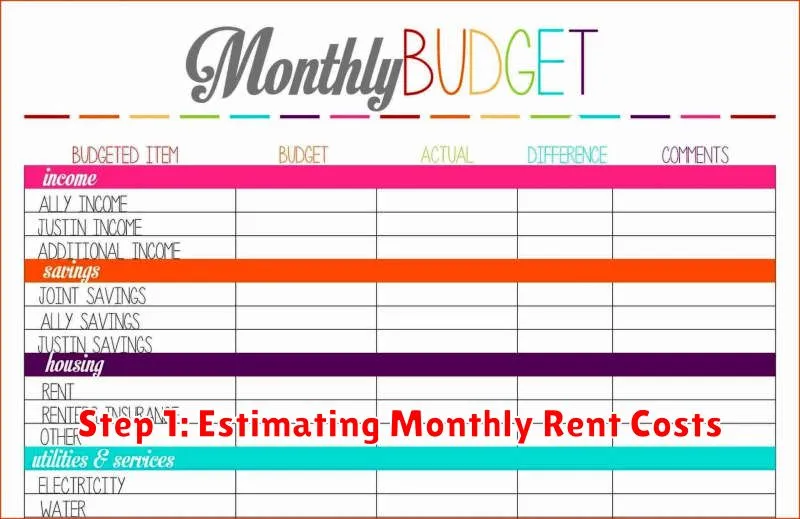So, you’re ready to take the plunge and rent your first house? Congratulations! Finding the perfect place is exciting, but before you start packing boxes, you need a solid plan. This guide, “How to Budget for Your First House Rental,” will walk you through everything you need to consider, from calculating your monthly rent and security deposit to factoring in utilities, homeowners insurance, and other unexpected expenses. Let’s make sure you’re financially prepared for this big step and avoid any nasty surprises. Learn how to create a realistic rental budget that works for you!
Introduction: Financial Planning for Rentals
Renting your first home is a significant financial step. Effective budgeting is crucial to ensure a smooth and stress-free experience. Before you even start searching for properties, you need a solid financial plan to manage the associated costs.
This plan should account for more than just the monthly rent. You’ll need to consider upfront costs like security deposits, application fees, and potentially first and last month’s rent. Beyond those initial payments, ongoing expenses such as utilities (electricity, gas, water), internet, renter’s insurance, and potential moving costs must be factored in.
Accurate financial planning minimizes the risk of financial strain and unexpected expenses. It allows you to confidently navigate the rental process, secure a suitable property within your means, and enjoy your new home without unnecessary worry. Creating a detailed budget is the foundation for responsible and successful renting.
Step 1: Estimating Monthly Rent Costs

Before you start searching for your dream rental, accurately estimating your monthly rent costs is crucial. This forms the foundation of your entire budget.
Begin by researching average rental prices in your desired neighborhood or city. Websites like Zillow, Apartments.com, and Trulia offer valuable resources to compare listings. Consider factors like property size (number of bedrooms and bathrooms), amenities (parking, in-unit laundry), and location (proximity to work or public transport).
Don’t just focus on the advertised rent. Remember to factor in additional monthly costs. This includes utilities (electricity, gas, water, internet, cable), renters insurance (highly recommended!), and potentially pet fees if you have furry friends. Also, consider any potential application fees or security deposits, which are typically paid upfront.
To ensure accuracy, check several listings and look for a range of prices. Averages can be misleading, so aim for a realistic estimate that encompasses potential variations. Building a buffer into your budget is always a good idea to account for unexpected expenses.
Once you have a solid estimate of your total monthly rental costs, including all associated fees and utilities, you can move on to budgeting for other essential expenses in your next step.
Step 2: Considering Utility and Maintenance Expenses
Once you’ve estimated your rent, it’s crucial to factor in the often-overlooked costs of utilities and maintenance. These expenses can significantly impact your monthly budget.
Utilities typically include electricity, water, gas, internet, and trash services. Research average costs for your prospective rental location. Contact utility companies directly or check online resources for estimates. Consider seasonal variations; heating costs will be higher in winter, for instance.
Maintenance encompasses repairs and upkeep. While your landlord might cover some major repairs, you’ll likely be responsible for smaller issues, like replacing lightbulbs or unclogging drains. Build a contingency fund for unexpected maintenance needs. A reasonable starting point could be $50-$100 per month, depending on the age and condition of the property. This helps avoid financial strain when unexpected repairs arise.
By diligently budgeting for both utilities and maintenance, you’ll gain a more realistic picture of your total housing costs and avoid unpleasant financial surprises. Thorough planning now will contribute to a smoother and more financially stable rental experience.
Step 3: Allocating for Security Deposits
Security deposits are a crucial part of renting a house. Landlords typically require a deposit equal to one or two months’ rent to cover potential damages or unpaid rent.
Before signing a lease, carefully review the lease agreement to understand the exact amount required and the terms for its return. This amount should be factored into your overall moving budget.
Saving for the security deposit should begin well in advance of your move-in date. Treat it like any other significant expense, setting aside a portion of your income each month until you have the full amount. Consider opening a separate savings account specifically for this purpose to keep it easily trackable.
Remember, your security deposit is not free money. Keeping your rental property clean and in good condition will increase your chances of receiving a full refund once your lease is up. Understand what constitutes damage versus normal wear and tear to avoid unexpected deductions.
Step 4: Saving for Moving Costs
Moving can be surprisingly expensive! Don’t underestimate the costs associated with relocating to your new rental. Set aside a dedicated savings fund specifically for moving expenses well in advance.
Consider these costs: Truck rental or moving company fees, packing supplies (boxes, tape, bubble wrap), potential fuel costs for your vehicle or the moving truck, and the cost of meals during the moving process. If you’re hiring movers, get multiple quotes to compare prices.
Start saving early. Even small amounts saved consistently over several months can significantly reduce the financial burden of moving day. The more you save, the more options you’ll have and the less stressed you’ll be.
Unexpected costs happen. It’s wise to overestimate your expenses slightly to account for unforeseen costs. Having a buffer in your moving budget can prevent unexpected financial strain.
Track your spending. As you start saving, keep track of how much you’re putting aside and what you are spending it on. This will help you better estimate your needs and ensure you have enough money saved before the move.
Tips for Negotiating Rent Within Your Budget
Negotiating rent can feel daunting, but it’s often possible to secure a lower monthly payment. Preparation is key. Before contacting a landlord, thoroughly research comparable rentals in the area to understand the market rate. This gives you leverage during negotiations.
Timing matters. Landlords are often more willing to negotiate during slower rental periods (e.g., winter months). Consider offering to sign a longer lease; this provides landlords with greater security and can incentivize them to lower the rent.
Highlight your strengths as a tenant. Emphasize your stable income, excellent credit score, and commitment to responsible tenancy. These factors make you a desirable tenant, strengthening your negotiation position. A well-written application and a polite, professional demeanor go a long way.
Be prepared to walk away. If the landlord is unwilling to budge on rent, you may need to consider alternative properties. This is a difficult but sometimes necessary strategy to ensure you find a place within your budget. Remember, finding the right place within your means is paramount.
Don’t be afraid to ask. The worst they can say is no! Politely and respectfully propose a lower rent, justifying your offer with the market research you’ve conducted. You might be surprised at the outcome.
Conclusion: Managing Finances for Your First Rental
Securing your first rental property is a significant step, and successful financial management is crucial for a smooth and stress-free experience. Remember to carefully track all your expenses, from rent and utilities to groceries and entertainment. Creating a realistic budget is paramount – allowing for unexpected costs and building an emergency fund will prevent financial setbacks.
By diligently monitoring your spending and adhering to your budget, you’ll not only maintain financial stability but also build a strong financial foundation. This disciplined approach will serve you well not only during your first rental experience but also in future financial endeavors. Congratulations on taking this important step towards independent living!

